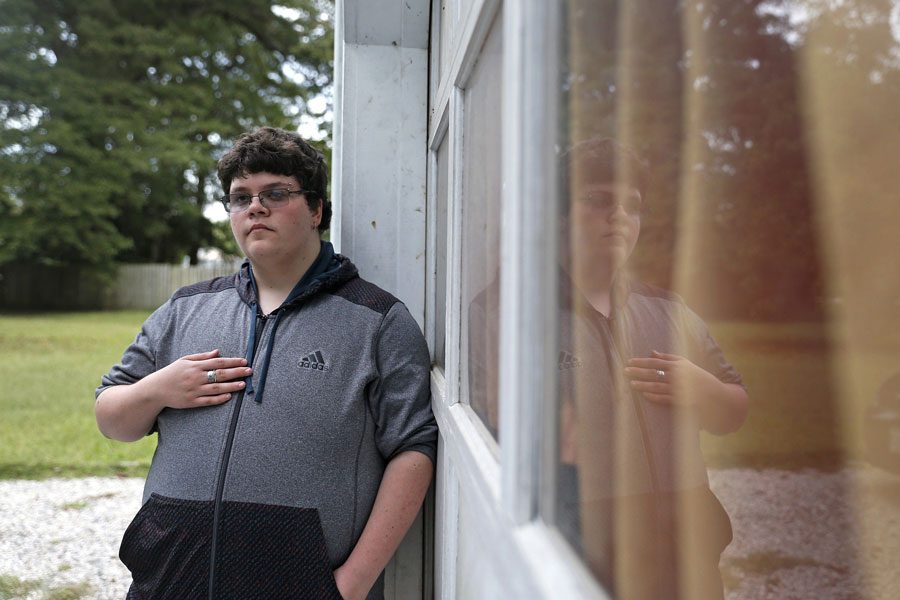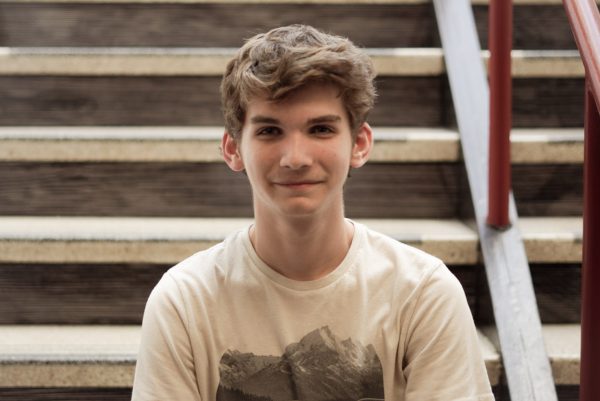More awareness needs to be brought to LGBT teen rights
Jonathon Gruenke/Newport News Daily Press from Tribune News Service
Gavin Grimm, who identifies as a transgender boy, is requesting to be allowed to use the boys’ restroom at Gloucester High School. The U.S. Supreme Court has recently rejected hearing the case and sent it back to the lower court.
March 6, 2017
Another day, another confrontation, another time being called a “fag” and “satanic.”
The only difference between this and high school bullying, is that these comments come directly from Lennon’s* parents.
Lennon cries in her room and cannot help think about taking her own life.
Being only 15, she knows there is little she can do. Despite the obvious hate and resentment, she is forced to go home to that house each night.
Not only does she feel wrong, but also unloved. Lennon feels there is no place for her in this world if her own family cannot accept her.
Everyday, thousands of LGBT teens face discrimination and torment in not only schools and public places, but also at home.
According to The Trevor Project, a nonprofit organization promoting the wellbeing of LGBT youth, LGBT teens are 4 times more likely to commit suicide. However, teens living in unsupportive homes are 8.4 times more likely to attempt suicide.
The day Donald Trump got elected, the amount of teens who usually called the Trevor Hotline Project doubled.
This needs to stop.
“Being insulted for who you are, being thought of as something less in your own home; it takes a toll on your mind,” Lennon says. “It hurts me so much.”
Although this is just as painful as physical abuse, until a child turns 18, they have little to no legal rights. It’s time to start easier emancipation for teens living in hateful environments.
In Illinois, the current requirements to get emancipated include living out of your home, having parents who support the emancipation, and having a steady income to support yourself completely.
Clearly, no LGBT child desperate for emancipation will meet these requirements.
Meeting these terms is especially difficult for teens whose parents are determined to “fix” their child.
The truth is that, in many cases, parents never change.
A teen will be forced to live in that hostile environment until the day they turn 18, which can be very detrimental to a teen’s mental health.
In an interview with Jessica Valenti for The Guardian news, Diego Sanchez, PFLAG’s director of public policy comments on the issue.
“It’s no longer good enough to remind LGBT kids that ‘it gets better,’” Sanchez says. “We need to figure out more legal, safe alternatives for those who can’t wait that long.”
One immediate change that needs to be made to emancipation laws include not requiring parents permission. An abusive parent doesn’t deserve to decide whether their kid will continue to endure the hatred in their homes.
Living out of the home also should not be a factor in deciding whether a teen can be emancipated or not, because sometimes, that is their only choice.
With these few changes, the lives of millions of helpless teens could be changed forever.
Easier emancipation for LGBT teens in emotionally abusive homes will not only help the LGBT community as a whole, but save hundreds and thousands of lives each year.
*names have been changed to protect the privacy of individuals








